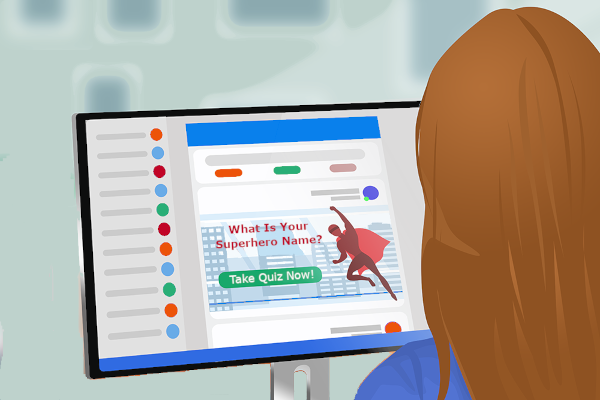You may think it is a bit of fun to type in your answers to the quiz, which asks silly questions such as your nickname and first model of car? You may think it is some plain old fun, but many of these social media questionnaires are set up by hackers to steal your identity.
It may seem like a harmless collection of random facts from your past when these quizzes ask for details such as:
- What was your first job?
- What was your first pets name?
- Where were your born?
- What car did you learn to drive in?
- What is your favourite colour?
- What was your first concert?
These popular quizzes can promise to tell you your “rock star” name or your “superhero” name. You know it’s as reliable as the Magic Eight ball, but you play along anyway as we all need a laugh, right?
Except that in the end the only people really laughing are hackers! Many of the questions posed are also security prompts used to verify your identity online.
Cybersecurity experts agree: do not take these quizzes. It is not as if there is any real value in you filling out these social questionnaires. You are simply taking the bait and risking having your personal data stolen.
Avoiding Social Media Scams
Here are some tips to help keep you safe from social media hackers:
- Be wary of any quiz that asks for information that could be relevant to your online password or security questions associated with your online accounts.
- Do not get hooked by clicking on that post that seems too good to be true, especially shocking, or scandalous.
- Fill out questionnaires on reputable websites only.
- Avoid quizzes that ask you to provide your email address.
- Contact companies through trusted channels only.
- Make sure that you are dealing with the proper entity’s real website and not a look-alike site created by a scammer.
Also be wary about sites that asks for a photo. The apps or website may change your face into a cartoon character or a painting but facial recognition is now a more common security tool. Thus be very cautious about letting unknown websites or apps collect your photos and facial details.
Three Things To Do If Your Online Accounts Are Hacked
Some things to do for long-term recovery are:
1) Have Your Devices Inspected By Trusted IT Experts.
Make sure these companies are real and not fake. Scam artists will set up websites that appear to be affiliated to the manufacturer or phone numbers that appear to go to technical support specialists. It is best to take your devices to a physical repair location with a real human who you can see and who does the actual work. Be wary of people ringing you out of the blue and accessing your computer remotely.
2) Change Your Passwords.
When your account is hacked, you need to change your account password immediately. Plus, as annoying as it is, change all your passwords for any accounts accessed on the compromised device. The hackers may have installed a malware program that tracks all data transmitted on the device.
3) Contact Any Relevant Financial Institutions.
Notify any financial institutions or credit card companies if those accounts are hacked. They will more than likely issue you with new cards with fresh account numbers. You can also ask them to monitor your accounts for fraudulent transactions. You might also set up credit monitoring with your region’s credit reporting agencies.
Keep in mind that criminals can be patient and may not use your information right away. So, do not think you are in the clear because nothing happens in the first few weeks.
Need help protecting your devices and online accounts? Contact our IT experts today and we can also review your security setup to help prevent you being victim of a cyberattack.

